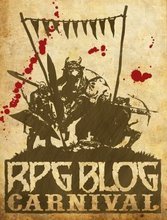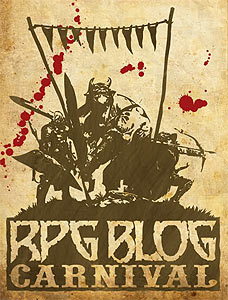Predicting is always a tricky prospect. Where will D&D be in five years? 10 years? 20?
 While I would love to sing D&D’s praises to the highest, I’m afraid that five years down the road, I won’t be playing it. What I mean is, that it’s unlikely I’ll be playing whatever the current edition of that time is. Most likely, I’ll still be playing 3.5 ed with the occasional “beer and pretzels” 1st ed game.
While I would love to sing D&D’s praises to the highest, I’m afraid that five years down the road, I won’t be playing it. What I mean is, that it’s unlikely I’ll be playing whatever the current edition of that time is. Most likely, I’ll still be playing 3.5 ed with the occasional “beer and pretzels” 1st ed game.
You see, I actually left the D&D fold completely after the introduction of 2nd ed. After playing (pretty much exclusively) D&D for almost 10 years, I got far more intrigued by other games: Amber, GURPS, Ars Magica, Trinity, World of Darkness, Traveller, various home-brew systems, including my own. I’d gotten frustrated with 1st ed’s limitations — that a thief always had the same skills as every other thief, etc., not to mention the whole alignment controversy (which I won’t go into here).
It was 3rd ed. that brought me back. The addition of skills and feats meant that I could have a thief that was more of a highway man, or a magic-user who was a “people person” and not a high-powered blaster. But despite the new additions to the system, I felt it still managed to keep the flavor of D&D. Now don’t ask me to quantify why — I can’t. It’s just to me it still, for some untangible reason, “feels” like the 1st ed. D&D done better.
Now 4th ed. doesn’t do a thing for me. To me, it feels like an MMORG brought to the tabletop. Not a bad thing, if that’s what you’re into and I can see how it would be very accessible for brand new players. It looks like, from my read-throughs, that it’s a good game in it’s own right. It’s just not my cup of tea for a number of reasons. And, to me, it doesn’t feel like D&D. Again, that’s an emotional, gut-reaction and I can’t put my finger on why. But because of it, I’m very unlikely to buy anything from the line.
Will there be a D&D in the future? I think there’ll still be something called “Dungeons and Dragons”. It’s staying power has been proven. Will I be playing it? That all depends on what the game does between now and then.
This post is part of the RPG Blogger’s July Blog Carnival.



 This month’s blog carnival topic is worldbuilding. How do you get the worlds you use for your game? Do you create your own or use a published world? If you create your own, where did you start? What do you like best about building your own settings? What suggestions and resources do you have for teaching others how to build worlds of the their own? What are the pros and cons of building your own world? Where do you get the inspiration for your worlds.
This month’s blog carnival topic is worldbuilding. How do you get the worlds you use for your game? Do you create your own or use a published world? If you create your own, where did you start? What do you like best about building your own settings? What suggestions and resources do you have for teaching others how to build worlds of the their own? What are the pros and cons of building your own world? Where do you get the inspiration for your worlds.


![Reblog this post [with Zemanta]](http://img.zemanta.com/reblog_c.png?x-id=8bf58850-5515-496c-ae21-82a2c87946bf)




